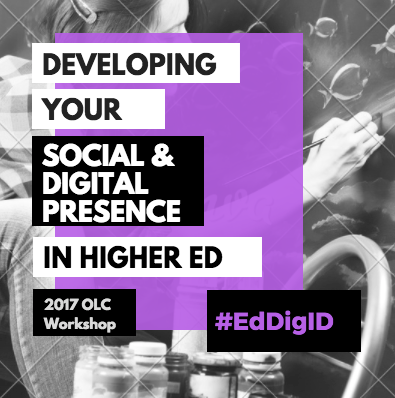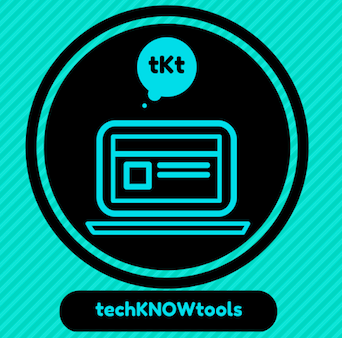I just started reading the new book, The Digital Academic (Lupton, Mewburn, & Thomson, 2018), and I was reminded of the debate in The Guardian on being or not being a “serious academic.” These two articles argue the merit of how scholars participate (or should not) on social media and digital networks. The two sides see involvement on social networks as either public discourse and knowledge sharing or as a complete waste of time only used for personal reputation management. Not surprising, this how networked practice is mirrored among the administrative staff I have been interviewing. Often postsecondary educators express the need to “be professional online.” Depending on the campus culture, professionals are either encouraged or discouraged from actively engaging online on social media. Most staff expressed uncertainty of any policies, expectations, politics, and implications of their own social media use. And commonly, social media and digital technologies are not often guided by academic institutions or via the professional organizations/associations. What is exciting about this edited collection (that I’ve read so far), is it unpacks these binary perceptions and dichotomous narratives. There is so much more to discuss than just good vs. bad for these social, online contexts. Just like our social identities, our online selves are so much more complex and things get complicated when we interact on certain platforms, connect with particular communities, and experience “being” within social networks. Just like our social identities, our online selves are so much more complex and vary in certain contexts. Things tend to get complicated when we interact on certain platforms, connect with specific communities, and experience “being” within particular professional online networks. Online identity is more fluid and less compartmentalized than ever before. Sure we share our practices and offer praise; however, there seem to be escalating issues and challenges we need to talk about in these online environments.
 Sure, I can reflect back to the early days of participating in open, digital channels to ask for advice, share resources, support one another, and really have a bit of a chat (and banter) with loads of colleagues in #highered. I have definitely benefited from the offering of professional development via Twitter, open sharing of learning on blogs, and wealth of knowledge being shared by videos, open documents, and curated resources via my personal learning network. Although I still experience benefits to “working out loud” and participating in these online social networks, I believe “being online” in higher ed looks today looks different from when I first started, plus I recognize my own points of social privilege I have in these spaces. Our networks have grown up and with this scaled new look comes concerns about privacy, data collection, and reputation management. Additionally, there are a number of unwritten rules and informal sanctions facing higher ed faculty and staff in these social, digital places. “Academic work and academic selfhood in the increasingly digitised realm of higher education are fraught with complexities and ambivalence” (Lupton et al., 2018, pp. 15-16). So much is left unanswered:
Sure, I can reflect back to the early days of participating in open, digital channels to ask for advice, share resources, support one another, and really have a bit of a chat (and banter) with loads of colleagues in #highered. I have definitely benefited from the offering of professional development via Twitter, open sharing of learning on blogs, and wealth of knowledge being shared by videos, open documents, and curated resources via my personal learning network. Although I still experience benefits to “working out loud” and participating in these online social networks, I believe “being online” in higher ed looks today looks different from when I first started, plus I recognize my own points of social privilege I have in these spaces. Our networks have grown up and with this scaled new look comes concerns about privacy, data collection, and reputation management. Additionally, there are a number of unwritten rules and informal sanctions facing higher ed faculty and staff in these social, digital places. “Academic work and academic selfhood in the increasingly digitised realm of higher education are fraught with complexities and ambivalence” (Lupton et al., 2018, pp. 15-16). So much is left unanswered:
- What happens when our personal and professional online networks intersect and come to campus?
- What behaviours and use of social media are acceptable for your role, discipline, and institution?
- How do we work online and offline, when the boundaries are poorly defined and perhaps even seamless?
- What implications are there for being online and connected in 2017?
- How does being active on social media or in networked spaces impact career development and advancement?
- What are we not learning about networked practice in higher ed we should know more about?
These are the questions I am asking (in my research and for my practice), and they are why I developed an OLC online workshop:#EdDigID: Developing Your Social & Digital Presence in Higher Ed (#AcDigID)
 Next week (September 25-October 1, 2017) is the last offering of this workshop for 2017. [Update: I’m teaching the #AcDigID version January 8-14, 2018 for academic faculty and researchers.] This 7-day short course is like an expanded, self-pace webinar to understand and identify what it means to be networked as a higher education professional. This course was created 1st targeted only at networked scholars (#AcDigID), and it has evolved to discuss the affordances and challenges faced by both academic and administrative staff in higher ed who are digitally engaged. Although this workshop was pitched to me as a “how to” develop your online presence on social media, I think it would be a disservice to postsecondary practitioners if we did not discuss the blurred lines of our occupational selves, including private vs. public, online vs. offline, and context collapse between our personal and professional networks.
Next week (September 25-October 1, 2017) is the last offering of this workshop for 2017. [Update: I’m teaching the #AcDigID version January 8-14, 2018 for academic faculty and researchers.] This 7-day short course is like an expanded, self-pace webinar to understand and identify what it means to be networked as a higher education professional. This course was created 1st targeted only at networked scholars (#AcDigID), and it has evolved to discuss the affordances and challenges faced by both academic and administrative staff in higher ed who are digitally engaged. Although this workshop was pitched to me as a “how to” develop your online presence on social media, I think it would be a disservice to postsecondary practitioners if we did not discuss the blurred lines of our occupational selves, including private vs. public, online vs. offline, and context collapse between our personal and professional networks.
Here are the learning goals for the workshop:
- Evaluate social media and digital platforms for professional development and connected learning in the field;
- Establish effective strategies for developing/creating/improving your digital identity for open, networked practice; and
- Outline the benefits and challenges of open and digital practice, especially when considering what it means for higher education staff and faculty are active on social media and in networked spaces.
For those who join this course, we will dig deeper into to help YOU consider HOW and WHERE you want to present (or not present) online. SIGN UP HERE! If you are not able to formally join the #EdDigID workshop next week, no need to fear! I have created a few ways YOU can get involved, perhaps contribute, and potentially drop into this learning party/conversation:
- TWITTER:
- TWEET: Share resources around digital identity, networked experiences, and how you learn online and on social media using the workshop hashtag: #EdDigID
- SHARE HASHTAGS: What hashtags do you track on or who do you follow on Twitter? What hashtags are YOU interested for colleagues in higher ed? #EdDigID
- TW-LISTED: I have been curating Twitter lists for quite some time that includes peers in higher ed, academia, academic advising, librarians, and MORE! Do I need to add you to one of my Twitter lists? Please advise (on Twitter or in the comments below).
- JOIN the#EdDigID TWITTER CHAT: Join us for the live, synchronous Twitter chat on Friday, September 29th from 2-3 pm CDT on the Twitters. We’ll be hanging out in this TweetChat Room and I will moderate this chat here: http://tweetchat.com/room/EdDigID
- LINKEDIN:
- CALL FOR CONTRIBUTION: Are you using closed/private groups and networks on social media platforms? Are you forming communities to share in digitally closed spaces, e.g. Private/Secret Facebook Groups, Slack, Mastodon, etc.? Let me know! I will be hosting a synchronous meeting online next Wednesday (9/27) from 1-2 pm CST and I would LOVE if you could JOIN THE CONVERSATION if you’re interested/available.
- PODCASTS:
- From my personal interest in podcast listening (and producing of podcasts), I have been curating The Higher Ed Podcast List: http://bit.ly/higheredpodcasts for The Higher Ed Podcast Project. Tell me, what should be on my podcast feed AND what podcasts should the #EdDigID participants listen to?
- RESEARCH:
- SIGN UP FOR AN INTERVIEW: Did you know Paul Eaton and I are interviewing higher ed professionals to understand more about their networked self and networked experiences? If you are interested in sharing what your online experience has been like as either an individual or as a member of a networked community, we’d love to chat and interview you! => SIGN UP HERE: http://bit.ly/networkedself
Reference:
Lupton, D., Mewburn, I., & Thomson, P. (2018). The digital academic: Critical perspectives on digital technology in higher education. New York, NY: Routledge

This sounds like an excellent workshop. I will check out the Twitter chat, if I’m able. I wanted to recommend this podcast, based in South Africa, which addresses critical issues in HE, https://theacademiccitizen.org/
LikeLike
Excellent! I will add this podcast to the list if we don’t have it already. Thanks! Please do join the #EdDigID chat on Friday if you can. I will be hosting this workshop again the week of January 8, 2018, for academics and scholars as well!
LikeLiked by 1 person